Related Research Articles

Aberdare is a town in the Cynon Valley area of Rhondda Cynon Taf, Wales, at the confluence of the Rivers Dare (Dâr) and Cynon. Aberdare has a population of 39,550. Aberdare is 4 miles (6 km) south-west of Merthyr Tydfil, 20 miles (32 km) north-west of Cardiff and 22 miles (35 km) east-north-east of Swansea. During the 19th century it became a thriving industrial settlement, which was also notable for the vitality of its cultural life and as an important publishing centre.

Jack Jones was a Welsh miner, Trade Union official, politician, novelist and playwright.

David Alfred Thomas, 1st Viscount Rhondda, PC, was a Welsh industrialist and Liberal politician. He was UK Member of Parliament (MP) for Merthyr Tydfil from 1888 until the January 1910 general election, then MP for Cardiff until the December 1910 general election, when he left politics to concentrate on his business interests. He was made a member of the Privy Council in 1916. He later held office, notably as "Food Controller" in Lloyd George's wartime coalition government.

Maerdy is a village and community in the county borough of Rhondda Cynon Taf, and within the historic county boundaries of Glamorgan, Wales, lying at the head of the Rhondda Fach Valley.
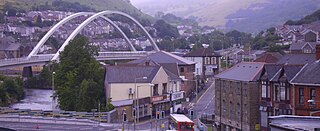
Porth is a town and a community in the county borough of Rhondda Cynon Taf, within the historic county boundaries of Glamorgan, Wales. Lying in the Rhondda Valley, it is regarded as the gateway connecting the Rhondda Fawr and Rhondda Fach valleys because both valleys meet at Porth. The Welsh word "porth" means "gate". Porth is a predominantly English-speaking community.
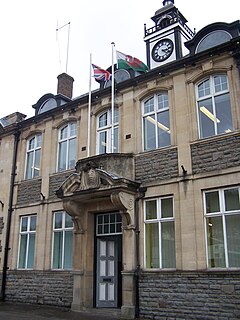
Mountain Ash is a town and former community in the Cynon Valley, within the County Borough of Rhondda Cynon Taf, Wales, with a population of 11,230 at the 2011 Census, estimated in 2019 at 11,339. It includes the districts and villages of Cefnpennar, Cwmpennar, Caegarw, Darranlas, Fernhill, Glenboi and Newtown, all within the historic county boundaries of Glamorgan. Aberdare lies about 4.5 miles (7.2 km) north-west, Cardiff 19 miles (31 km) south-east, and Penrhiwceiber a mile to the south-east. It divides into two electoral wards: West covers the town centre and the districts of Miskin, Darranlas, Fernhill and Glenboi, and East the districts of Cefnpennar, Cwmpennar, Caegarw and Newtown.

Abercynon, is both a village and a community in the Cynon Valley within the unitary authority of Rhondda Cynon Taf, Wales. The community comprises the village and the districts of Carnetown and Grovers Field to the south, Navigation Park to the east, and Glancynon to the north.

Rhondda, or the Rhondda Valley, is a former coalmining area in South Wales, previously in Glamorgan, now a local government district, of 16 communities around the River Rhondda. It embraces two valleys – the larger Rhondda Fawr valley and the smaller Rhondda Fach valley – so that the singular "Rhondda Valley" and the plural are both commonly used. In 2001, the Rhondda constituency of the National Assembly for Wales had a population of 72,443; while the Office for National Statistics counted the population as 59,602. Rhondda forms part of Rhondda Cynon Taf County Borough and of the South Wales Valleys. It is most noted for its historical coalmining industry, which peaked between 1840 and 1925. The valleys produced a strong Nonconformist movement manifest in the Baptist chapels that moulded Rhondda values in the 19th and early 20th centuries. It is also famous for male voice choirs and in sport and politics.

Ferndale is a town and community located in the Rhondda Valley in the county borough of Rhondda Cynon Taf, Wales. Neighbouring villages are Blaenllechau, Maerdy and Tylorstown. Ferndale was industrialised in the mid-19th century. The first coal mine shaft was sunk in 1857 and was the first community to be intensively industrialised in the Rhondda Valley.

The Miners Strike of 1910-11 was an attempt by miners and their families to improve wages and living conditions in severely deprived parts of South Wales, where wages had been kept deliberately low for many years by a cartel of mine owners.

Grand Slam is a 1978 sports comedy film produced by BBC Wales. The film starred Oscar-winning actor Hugh Griffith, Windsor Davies, Dewi "Pws" Morris and Sion Probert. The play was written for television by Gwenlyn Parry and then-head of drama for BBC Wales, John Hefin.

Ton Pentre is a village in the Rhondda Valley in the county borough of Rhondda Cynon Taf, Wales. Historically part of Glamorgan, Ton Pentre, a former industrial coal mining village, is a district of the community of Pentre. The old district of Ystradyfodwg was named after the church at Ton Pentre. Ton Pentre is, perhaps, best known for an event in 1924, when the Duke of York played a round of golf with Trade Unionist Frank Hodges.
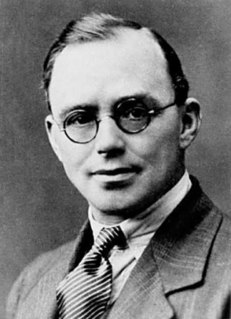
Arthur Lewis Horner was a Welsh trade union leader and communist politician. During his periods of office as President of the South Wales Miners Federation (SWMF) from 1936, and as General Secretary of the National Union of Mineworkers (NUM) from 1946, he became one of the most prominent and influential communists in British public life.
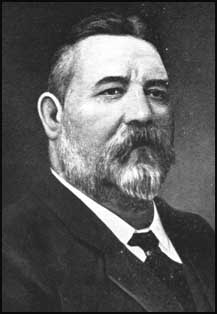
William Abraham, universally known by his bardic name, Mabon, was a Welsh trade unionist and Liberal/Labour politician, and a member of parliament (MP) from 1885 to 1920. Although an MP for 35 years, it was as a trade unionist that Abraham is most well known. Initially a pioneer of trade unionism, who fought to enshrine the principle of workers' representation against the opposition of the coal-owners, he was regarded in later life as a moderate voice believing that disputes should be solved through conciliation rather than industrial action. This drew him into conflict with younger and more militant leaders from the 1890s onwards. Although the defeat of the miners in the Welsh coal strike of 1898 was a clear defeat for Mabon's strategy, his prestige was sufficient to ensure that he became the first president of the South Wales Miners' Federation which was established in the wake of the dispute. Abraham was noted for his powerful speaking voice, and was a renowned orator in English and Welsh.
William Henry Mainwaring was a Welsh coal miner, lecturer and trade unionist, who became a long-serving Labour Party Member of Parliament. Both as a trade unionist and a politician he struggled, largely successfully to counter Communist influence. He was said to have spoken "with passion and fire on behalf of his fellow miners".

Penygraig is a village and community in the Rhondda Valley in the county borough of Rhondda Cynon Taf, Wales. As a community Penygraig contains the neighbouring districts of Dinas, Edmondstown, Penrhiwfer and Williamstown. Penygraig is within the historic county boundaries of Glamorgan. The name Penygraig is Welsh for 'head of the rock'.

David Watts Morgan,, who later in life hyphenated his name to Watts-Morgan, was a Welsh trade unionist, a Labour politician, and a Member of Parliament (MP) from 1918 to 1933.
Idris Cox was a Welsh communist activist and newspaper editor.
The second election to the Glamorgan County Council was held on 8 March 1892. The 1889 election was the first contest and the next was the 1895 election. Glamorgan County Council had been established by the 1888 Local Government Act, and the first election held in January 1889. Glamorgan was by far the largest county in Wales in terms of population. The county of Glamorgan was at this time becoming heavily industrialised, although some areas such as the Vale of Glamorgan remained essentially rural. The rise of nonconformist liberalism, especially since the 1860s, throughout Wales, had challenged the prevailing influence of the landed gentry. However, even in 1889, the traditional forces remained influential and no working men were elected to the Council. This changed in 1892 with the unopposed return of David Morgan in Aberdare and the success of Isaac Evans in Resolven.
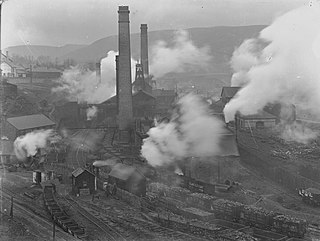
The Cymmer Colliery explosion occurred in the early morning of 15 July 1856 at the Old Pit mine of the Cymmer Colliery near Porth, Wales, operated by George Insole & Son. The underground gas explosion resulted in a "sacrifice of human life to an extent unparalleled in the history of coal mining of this country" in which 114 men and boys were killed. Thirty-five widows, ninety-two children, and other dependent relatives were left with no immediate means of support.
References
- ↑ Rebirth of a Nation: Wales 1880-1980, Kenneth O. Morgan, Oxford University Press, 1981